- Home
- Simon Beckett
Where There's Smoke (1997)
Where There's Smoke (1997) Read online
ABOUT THE AUTHOR
After doing an MA in literature, Simon Beckett started his own business, which he later sold to teach English in Spain. He's been a percussionist in a rock/pop band and is currently a freelance journalist, writing for national newspapers and colour supplements. He is married and lives in Sheffield. WHERE THERE'S SMOKE is his third novel. His previous novel, ANIMALS, won the Raymond Chandler Society's "Marlowe" award for Best International Crime Novel.
CORONET BOOKS
Hodder & Stoughton
Copyright 1997 Simon Beckett
First published in Great Britain in 1997 by Hodder and Stoughton
First published in paperback in 1998 by Hodder and Stoughton
A division of Hodder Headline PLC
The right of Simon Beckett to be identified as the Author of the Work has been asserted by him in accordance with the Copyright, Designs and Patents Act 1988.
A Coronet Ebook 10 98765432
All rights reserved. No part of this publication may be reproduced, stored in a retrieval system, or transmitted, in any form or by any means without the prior written permission of the publisher, nor be otherwise circulated in any form of binding or cover other than that in which it is published and without a similar condition being imposed on the subsequent purchaser.
All characters in this publication are fictitious and any resemblance to real persons, living or dead, is purely coincidental.
British Library Cataloguing in Publication Data
ISBN 0 340 68593 X
Hodder and Stoughton
A division of Hodder Headline PLC 338 Euston Road London NW1 3BH
For Hilary
ACKNOWLEDGEMENTS
Thanks to Dr Sheila Cooke and the team at the University of Sheffield's Department of Obstetrics and Gynaecology, Jessop Hospital; Dr Gwilym Hayes, Consultant Forensic Psychiatrist at Wathwood Hospital Regional Secure Unit; and Judy Winter, Head of Student Services at the University of Derby.
The article on pages 234-239 refers to two works which are: Faulk, M (1988) Basic Forensic Psychiatry, London, Blackwell Scientific Publications; and Jackson, H F (1994) Assessment of Fire-setters in The Assessment of Criminal Behaviours of Clients in Secure Settings, Eds McMurran M, Hodge J.
PROLOGUE
Some moments burn in the mind for ever. The landing is dark. Light comes from a window at the far end, enough to run by. Breath comes hard. From the stairs sound heavy footfalls of pursuit. The landing ends in a last doorway. There is no more running, only the need to hide. Inside the room it is even darker. It is like walking in ink. Blind, she feels her way through the half-familiar landmarks of beds and bookshelves. And then there is the wall. She presses against it, trying to stifle the breaths that tear at her throat. Her heart thuds. Blood from the wound is sticky, and at her touch there is a white leap of pain that lightens the darkness. She hears the footsteps now, drawing closer. Along the corridor doors are opened, one at a time, until there is only hers left. The smell of petrol is sweet and heavy in its threat. She hugs her stomach, feeling the small pulse of new life inside, curled and vulnerable. The footsteps stop. A whisper of the door opening. Her name. "Kate."
The light is turned on. Some moments burn in the mind for ever.
CHAPTER 1
The warehouse had been burning all night. Smoke rolled into the sky, a darker cloud in an overcast morning. The bonfire smell of it thickened the air, giving the spring day a premature flavour of autumn. The rush-hour faces outside King's Cross were turned to the dark column as Kate came up the steps from the Underground. The smoke rose above the rooftops in front of her, then the buildings closed in and blocked it from view. Kate barely noticed. A tension headache was creeping up her neck. She had just started chewing an aspirin, grimacing at the bitter tang, when she turned a corner and found the fire dead ahead. She halted, startled to find it so close, but carried on when she saw the street wasn't cut off. The roar and crackle of the blaze grew as she approached. Set back from the road, the warehouse was surrounded by a confusion of uniforms and yellow helmets, white cars and red engines. Hoses snaked across the ground, flinging streamers of water into the smoke. The flames licked out in random snatches of colour, indifferent to them. A hot breath of wind brushed her face, dusting it with ashes. She turned away, eyes stinging, and realised with surprise that she had slowed to a standstill.
Irritated with herself for gawking, she walked on, skirting the small crowd that had gathered by the police cordon. The warehouse was left behind. By the time she reached the Georgian terrace, several streets away, Kate had forgotten it. Most of the buildings in the terrace were run down, but one, cleanly painted, stood out like a raised hand in a classroom. Embossed in gold letters on its downstairs window were the words, "Powell PR & Marketing". Kate went in.
Three desks were fitted into the small office, angled to face each other. Standing behind one of them, a tall West Indian man with a shaved head was pouring water into a coffee filter. He gave her a grin.
"Morning, Kate."
"Hi, Clive."
The filter machine hissed and gurgled. He tipped the last of the water into it and set down the jug. "Well. The big day."
His voice had a faint Geordie lilt. Kate went to one of the two big filing cabinets and slid out a drawer. "Don't remind me."
"Nervous?"
"Let's say I'll be glad to find out one way or the other."
The coffee filter had subsided to low hisses. Clive poured two cups and handed her one. He had worked for her almost since she had started the agency, nearly three years earlier, and if ever she made anyone a partner, it would be him.
"Did you pass the fire on your way in?"
"Mm." Kate was flicking through the folders inside the cabinet.
"Been burning half the night, apparently. Bad about the kid, wasn't it?"
She looked at him. "What kid?"
"The baby. A group of squatters were living there. They all got out, except for the baby. It said on the news the mother got burned trying to go back for it. Two months old."
Kate put down her coffee cup. She was aware of the stink of smoke still clinging to her, and looked down to see tiny flecks of grey ash dotting her clothes. She remembered its feathery touch on her face, the tickle as she had breathed it in. She felt the sting of it again. She closed the filing cabinet without taking anything out. "I'll be upstairs."
Her office was on the first floor. Kate closed the door and batted the grey specks from her navy blue skirt and jacket. She knew she wouldn't feel comfortable in the suit again until she'd had it cleaned. Hanging her jacket behind the door, she went to the room's single window. Her reflection showed faintly in the glass as she looked out. Beyond it, the smoke was a spreading stain on the sky, against which her dark hair was invisible. Only her face was clear; a pale oval hanging in space. She turned away and went to her desk. Downstairs, she could hear voices as the others arrived. The front office was too small for Clive and the two girls, but the only other spare room needed redecorating and a new ceiling before anyone could work in it. It wouldn't be cheap. Kate sighed and reached for a file. As she opened it there was a tap on her door. "Come in."
A girl entered, carrying a Cellophane-wrapped bunch of red roses. Her plump face was openly curious as she handed them to Kate. "These have just been delivered."
A small envelope was tucked into the stems. Kate opened it and slid out the plain white card. A short note was written on it in swooping, forward-slanting script. She read it, then replaced the card in the envelope. She handed the roses back to the girl. "Thanks, Caroline. Take these outside and give them to the first old lady you see, will you?"
The girl's eyes widened. "What shall I say?"
"Anything. Just say they're with our compliments." Kate gave a tight smile. "And the nearer to ninety she is, the better."
She stopped smiling as soon as the door closed. She took out the card and read it again. "Commiserations in advance. Love, Paul."
Carefully, Kate tore it in half, then in half again before throwing it into her waste bin. Her entire body had tensed. She forced herself to relax. She turned to the file again, but the sudden beep of her telephone stopped her. She picked it up. "Yes?"
It was Clive. "Paul Sutherland from CNB Marketing's on the line." His tone was neutral. "Do you want me to tell him you're busy?"
Kate hesitated. "No, it's okay. I'll take it."
There was a series of clicks. She closed her eyes, briefly. A second later she heard the familiar voice. "Hi, Kate. Thought I'd ring and see if you'd got the flowers."
"Yes. A little bit premature, though, I think." She was pleased to hear her voice was steady.
"Oh, come on. You don't seriously think you're still in with a chance, do you?"
"Let's just wait and see what happens, shall we?"
She heard him sigh. "Kate, Kate, Kate. You know what's going to happen. You've done well to get this far, but don't kid yourself."
"Is that all you wanted to say? Because if it is, I've got work to do."
There was a chuckle. "Now don't be like that. I'm just giving you some friendly advice, that's all. For old times sake."
Kate clenched her jaw.
"Kate? You still there?"
"You've not changed, Paul. You always were a prick."
She regretted the words immediately. The amused laugh came down the line again, this time unmistakably pleased with itself. "And didn't you just love it? But I can see I'm wasting my time trying to talk sense to you. Poor little Kate's got to do things her way, even if it means getting her fingers burned. Just try not to be too disappointed."
The line went dead. Her knuckles were white as she banged down the receiver. The bastard. Kate fumbled in her bag, came up with a disposable lighter and a battered packet of Camels. Her hand shook as she put one in her mouth. She flicked a flame from the lighter and held it close to the cigarette without lighting it. The taste of stale tobacco was cold on her tongue when she inhaled. The flame quivered, but did not quite touch the cigarette. She held it there and counted to ten, then to ten again.
The second time it was easier. Grimacing, she clicked off the lighter and dropped the unlit cigarette into the bin. The packet and lighter went back in her bag. She put a sugar-free mint into her mouth to take away the taste. The shakes had gone, but her headache was back, fingering its way across her scalp. Kate wished she'd not tied her hair back so tightly that morning. She kneaded her temples, gently. Is it worth it?
When the invitation to tender for the Parker Trust account had landed on her desk six weeks earlier, she had gone into the pitch without any real expectation. The Trust specialised in the low-profile handling of investments for wealthy clients, funding just enough Worthy Causes (the words had been capitalised in their brief) to qualify as a charity. She had been surprised that they had even heard of Powell PR, let alone were prepared to consider them for a long-term, expensive campaign.
Then, amazingly, she had been short-listed. The shock of that still hadn't worn off when she discovered who the other short-listed company was, and who she would be pitching against.
From then on, the pitch had ballooned until it filled her entire horizon. Clive joked that she might as well install a bed at the office, to save going home at all. You're not happy unless you're working, he'd said. She had smiled, but behind it had been a dark stirring of panic. Happy? That night at the gym she had strained until her muscles screamed, trying to burn off her restlessness like calories.
Now the waiting had concertinaed into the final hours. Redwood, the chairman of the board of trustees, had told her he would let her know the Trust's decision before noon.
Winning would mean financial security, perhaps eventually bigger premises. It would establish the agency's reputation, opening the way to bigger and better accounts. Kate didn't let herself consider what losing would be like.
She found she was clicking her ball-point pen aimlessly in and out. She stopped, put it down, and determinedly reached for the file she had opened earlier. She began to read it and make notes, haltingly at first, then more fluidly.
But every few minutes her eyes would stray to the clock on the wall. The morning passed slowly. Each time a call came through she stiffened, expecting it to be from the Trust. None were. At five to twelve she gave up even the pretence of trying to work. She sat in the silence of her office, looking at the clock and waiting for the phone to ring. The second hand crept round the dial, bringing the noon deadline closer. She watched as it converged with the other two. The three formed a single, vertical finger, poised for a moment, and then the second hand ticked indifferently into its downward sweep.
Kate felt the anticipation leak out of her. In its wake was a heavy residue of disappointment. The Parker Trust were almost obsessively punctual. If she'd won the pitch she would have heard by now. She didn't move as the fact of failure sank in, no longer a possibility but a reality to be faced. Abruptly, she shook herself. So you didn't get it. It's only a pitch. There'll be others. She sat straighter in her chair, doggedly re-opened the file she'd been working on.
The phone beeped. Kate started. It beeped again. She picked it up. "Yes?"
Caroline answered. "It's Mr Redwood from the Parker Trust."
Even though she knew what he was going to say, Kate felt her heart bump. She cleared her throat. "Put him through."
There seemed to be more clicks than usual as the transfer was made. The line hummed, hollowly. "Miss Powell?"
"Good afternoon, Mr Redwood." She allowed a faint emphasis to creep into the "afternoon".
"I apologise for the tardiness of the call. I realise you would have been expecting to hear sooner." The voice gave an accurate picture of the man. Scottish. Thin, dry and humourless. Clive had called him anal, and Kate hadn't been able to argue.
"Yes," she said, simply.
"Yes, I'm sorry about that." He didn't sound it. Kate felt a flash of antagonism. "It's our policy to inform the unsuccessful tender first," he went on, "to put them out of their misery, as it were, and it took a little longer than we anticipated."
It took a moment for the implication to register. Suddenly confused, Kate floundered. "I'm sorry…you've spoken to CNB?"
She heard Redwood give an exasperated sigh. "Perhaps I'd better start again. I'm pleased to tell you that your tender has been successful. The board of trustees has decided to invite your agency to handle our campaign."
Kate felt an almost out-of-body detachment. Outside, a siren Dopplered in and out of existence.
"Miss Powell? Is there a problem?"
"No! No, I…" She made an effort. "I'm delighted. Thank you."
"Again, I apologise for the delay." His voice became tinged with disapproval. "I'm afraid CNB were reluctant to accept our decision. The person we were dealing with became quite…insistent." Redwood brought himself up short. "Well. Congratulations, Miss Powell. We look forward to working with your agency."
Kate said something, she wasn't sure what. They agreed to meet later in the week. He rang off. She listened to the purr of the dialling tone before setting the receiver back in its cradle. From downstairs she could hear the drone of a photocopier, the peal of someone's laughter. She stared blankly out of the window. For a moment she thought the patch of darkness outside was a raincloud. Then she remembered. After a while she got up to tell the others.
The bus stopped outside the shops near her flat in Fulham. As Kate stepped off, it occurred to her, belatedly, that she could probably afford to get a taxi from the tube station now. Old habits died hard. She went into the Asian supermarket and bought a pint of milk and a packet of rice. After a moment of indecision she added a bottle of white Rioja to the wire basket.
/> There was a chill in the air as Kate left the shop, a reminder that spring had yet to reach further than the calendar. A drizzle had started, and she began walking faster, hoping to get home before it grew heavy enough to merit an umbrella. She almost trod on the child's mitten lying at the edge of a puddle. It formed a vivid splash of red against the dirty brown pavement, and couldn't have been there long because it still looked new and clean.
Kate picked it up, glancing up and down the street for the pram or buggy it must have dropped from. No one was in sight, so she cast around for a wall or window-ledge to put it on. There was nowhere, except back on the muddy pavement. Reluctant simply to discard it, she looked at the forlorn little object in her hand. The mitten was no bigger than her palm, and suddenly the memory of the warehouse fire came back to her. Kate felt her throat constrict, and before she knew what she was doing she had tucked the mitten into her pocket and walked on.
The drizzle had stopped by the time she reached her flat. The wrought-iron gate in front of the Victorian terraced house was open, as it always was since the hinges had dropped and wedged it against the path. The tiny garden, no bigger than a large rug, had been flagged over by a previous occupant, but a gap had been left in the centre for a thorny huddle of rose bushes. They needed pruning, Kate noticed absently. She went into the small open porch and unlocked the front door.
Envelopes were splashed on the black and white tiles in the cramped hallway. She bent and picked them up, shuffling through for those addressed to her. There were only two; one a bill, the other a bank statement. The rest was junk mail. She divided it up and put half on her ground-floor neighbour's coconut-fibre welcome mat. As she straightened, the door opened and the old lady who lived there beamed out at her.
"I thought I heard someone."
Kate mustered a smile. "Hello, Miss Willoughby, how are you?"

 Where There's Smoke
Where There's Smoke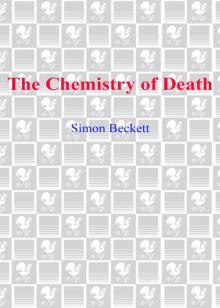 The Chemistry of Death
The Chemistry of Death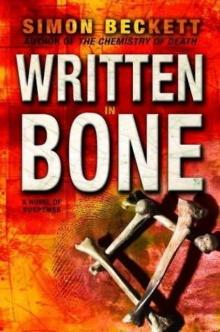 Written in Bone
Written in Bone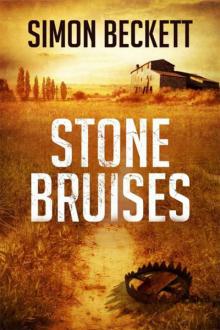 Stone Bruises
Stone Bruises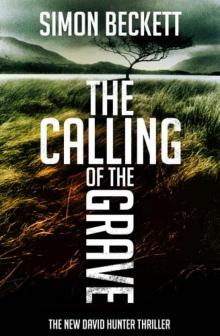 The Calling of the Grave
The Calling of the Grave Whispers of the Dead
Whispers of the Dead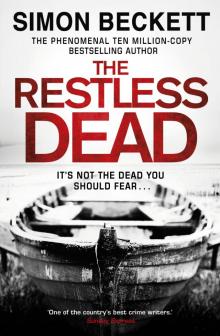 The Restless Dead
The Restless Dead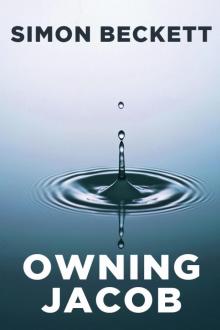 Owning Jacob
Owning Jacob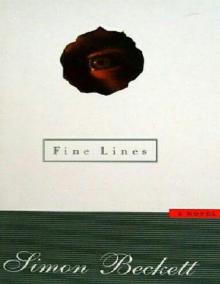 Fine Lines
Fine Lines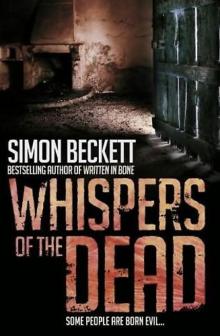 Whispers of the Dead dh-3
Whispers of the Dead dh-3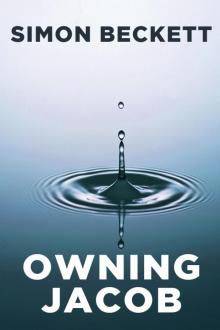 Owning Jacob (1998)
Owning Jacob (1998)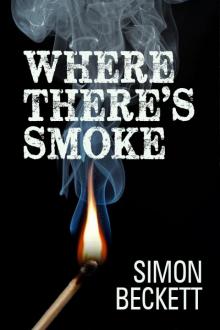 Where There's Smoke (1997)
Where There's Smoke (1997)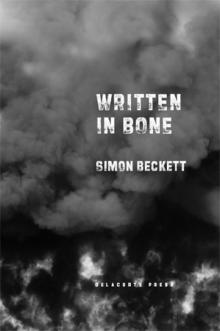 Written in Bone dh-2
Written in Bone dh-2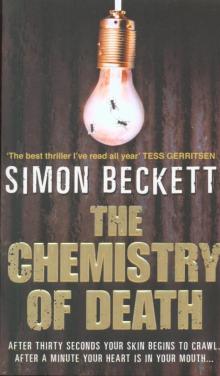 The Chemistry of Death dh-1
The Chemistry of Death dh-1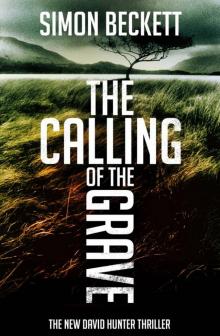 The Calling Of The Grave dh-4
The Calling Of The Grave dh-4